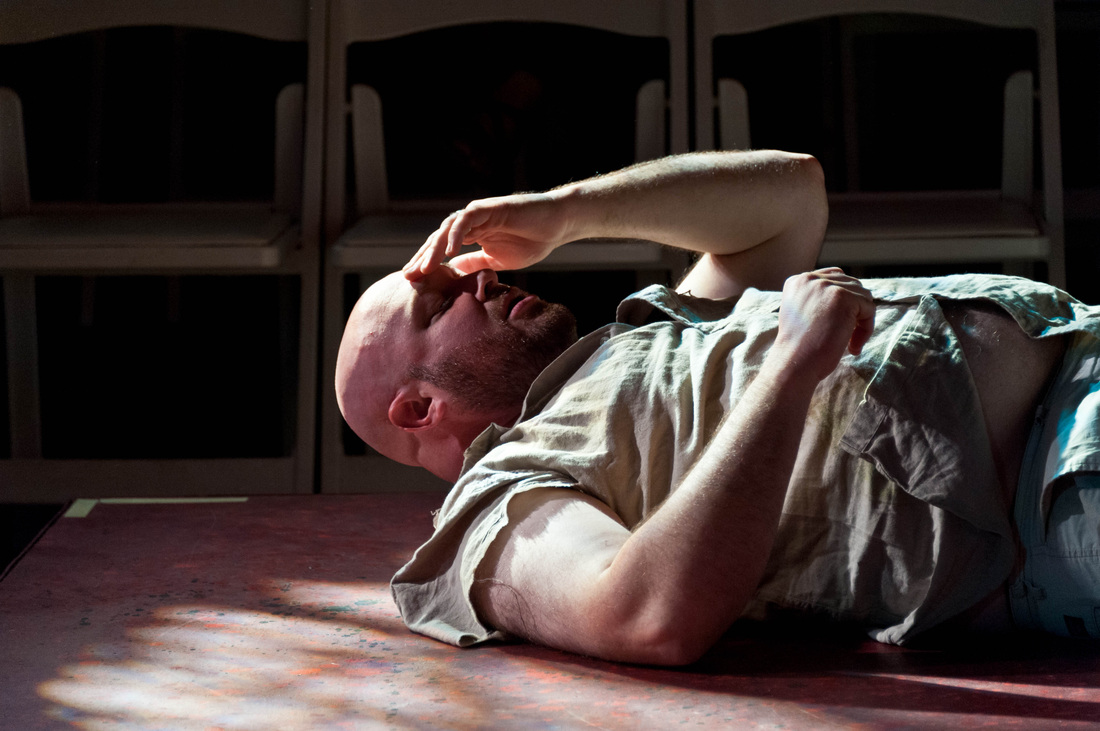|
JACQUELINE LAWTON: Why did you decide to get into theatre? Was there someone or a particular show that inspired you?
CHRISTINE LANGE: I'm not sure it was really a decision. I had a certain aptitude for creating my own world and telling other people what to do (some might say I was bossy) that lent itself naturally to theater. My first play was in the 2nd grade, but I didn't take theater classes until 7th grade. And even then, I never considered it as a potential career or something I'd devote my life to - it was just fun. My freshman year in college, I had plotted out my course as a biology-geology double major with appropriate internships, and eventual PhD in Marine Biology. A friend directed a short play I wrote as part of a cabaret at her college, and I went to see it. I was struck by the realization that these people were in this room because I had written a play. Something I put into motion as an individual drew all these people together to this one place. Whether it was writing, acting, or directing, whatever came out of it was unique to me, and I suddenly understood how much I craved that. It didn't matter if my version was better or worse (although you always want it to be better) than someone else's - it mattered that only I could do my version of it. So I transferred to George Mason and got my degree in Theater. JL: How long have you served as Artistic Director at your company? What drew you to the position? What keeps you there? CL: Grain of Sand is about 2 years old since it began with an application to 2011's Capital Fringe Festival. I was brought on as Artistic Director shortly after the first production, Hamlet: Reframed, was accepted into the 2011 line up. The project itself was interesting to me, but I've known two of the founders Carl Brandt Long and Sara Bickler (John Stange is also a founder) for a good chunk of time now. I already knew we had similar aesthetic tastes, but we have a variety of strengths and weaknesses that complement each other well. I was and continue to be excited by the ways those similarities and differences come through in our art. It really comes down to a lot of trust. I feel like I trust the people who make up Grain of Sand, and that gives me the freedom to stretch and try new things artistically. If I go too far, they'll give me a little nudge back onto safer ground, but we have a strong base to start from. JL: What is the most valuable lesson you learned during your tenure? Also, what skills and traits do you feel a successful artistic director should have to support the health and growth of an organization? CL: As a young company, we are very conscious of keeping the momentum going and increasing the visibility of our company. However, we are only human. No matter how much we'd all like to be 100% committed to every piece of every project, the human body can only handle so much stress and so many late nights. Caffeine will only take you so far. What we're learning now as a company is how to use the resources we have to the best advantage and to be realistic about which projects are priorities and at what scale they can feasibly be accomplished. I think it's important for an artistic director to have experience in most if not all the different aspects of theater. The more you know, the more respect you'll have for people who specialize in those areas, and then you can use that experience to help pick the right people for the right jobs. You cannot make a production happen on your own, and you have to be able to recognize when someone is better suited to a certain role. Likewise, you need to be able to identify when someone is not succeeding in a given position and find a better place for them. I think building trust with your team is the most important thing you can do. If people feel like you'll listen and that they can rely on you, problem solving the difficult issues will be a million times easier. JL: What excites you most about being an Artistic Director? CL: I love being responsible for crafting a plan that spans more than just one show - the sense of continuity. To look at a series of pieces and decide how they best fit together to create something bigger and better is challenging but incredibly satisfying. There's something about being outside the production in a sense - not in the trenches as the director or designers, etc. - that allows for so many more possibilities. I'm not limited by my own aesthetics or abilities as a director or a performer. If I can imagine something better that meets the needs of my company, I can go and find the people to make that project happen. It means my imagination can go wild, and I still feel the satisfaction of the piece because I helped bring all of those people together. It's like a big puzzle I enjoy solving: I want to use these people in this time frame with this budget, so what show should we do? It makes my brain work in a way completely different from other parts of my life, and that is very exciting to me. JL: What is the greatest challenge you faced being an Artistic Director? CL: It's hard work. Even for a small company, trying to juggle several different elements at the same time is tough. There are various priorities and personalities that all need to be considered and respected, and I need to weigh those interests against my own personal artistic goals as well as the company goals as a whole. It's a lot to balance. I think the biggest challenge is making sure I'm still listening and keeping an open mind about where the company is going. I don't want to get caught up in my excitement over a specific piece or project, but there are also times when it is okay to push my own agenda because it does match what the company needs to do to grow. JL: If your work as an artistic director doesn’t pay the bills, what else do you do? How do you balance your role leading an organization with your work as a director? Are you ever able to direct outside of your company? CL: Maybe someday Grain of Sand will have a full-time staff, but for now I work full-time as an Accounting Analyst for GWU's School of Public Health. I am very lucky to have a boss who is interested in my life in the theater and is willing to be flexible when I need to come in late or leave early. It's a gift to be able to say "I can't have a meeting that day - it's Opening Night" and know he'll understand. Right now, I'm primarily focusing on GoS for my artistic projects. We're working on building our pool of resources so that in the next year or so, we'll all have a little more wiggle room. But for the immediate future, we're working on defining our voice and creating our brand and that's my top priority. JL: Looking at your body of work as an artistic director and a director, how conscious are you and selecting plays by women or people of color when deciding your season? Also, when it comes to hiring administrators, designers and other directors do you take race and gender into consideration? CL: In general, I pick plays based on the content and the quality of the piece. We've put out calls for scripts, and they were evaluated without considering gender or race. In terms of building a team, the qualifications of the candidate and his/her ability to work successfully with the existing members are our only considerations. JL: DC audiences are ... CL: Getting there! I was having a conversation recently about "teaching" audiences. We were talking about companies that are good at bringing in brand new theater-goers who get bit by the theater bug and start going to see shows at other theaters. As we see more small theater companies popping up in DC, we're also seeing audiences adapt to a different kind of experience. Groups like GoS typically come with a smaller ticket price, but we're also more likely to be producing non-traditional projects. Audiences are learning to take a chance on us because the financial commitment is smaller, and while the outcome may be unexpected, it's usually interesting. I feel like audiences are recognizing smaller groups as their own tier of theater, and if they enjoy one group are more willing to take a chance on another group from the same tier. JL: DC actors and designers are ... CL: Dedicated. It's amazing how much people are willing to sacrifice to be a part of these projects. And the commitment they bring to each show is humbling. I think we're all used to working in a theater with no heat or no a/c or rats or whatever other issues, and that just becomes a minor complaint because there's nothing else we'd rather be doing. JL: DC playwrights are .. CL: Numerous, varied, and incredibly talented. The DC playwright community has been rich and vibrant for many many years, but I feel like they've become so much more accessible in the past couple of years thanks to social media. It's exciting to see so many playwright groups self-producing staged readings to get their work out there and get their names on the radars of companies that are looking for new work. I look forward to working with two local playwrights in this next year - one we're helping to workshop a commissioned piece and the other will be writing our Fringe show for 2013. JL: DC critics are ... CL: Diligent. There is so much theater happening in this town, and it's great to see these corps of critics getting out and reviewing pieces from all areas of the spectrum, from community theater to the big houses. For better or for worse, having a review of your show is still one of the easiest forms of PR. This is another area where the Internet and social media has improved accessibility and distribution. JL: What advice do you have for an up and coming theatre artists who have just moved to D.C.? CL: Go see shows and hang around with the cast & crew at the bar afterwards. Don't be afraid to ask questions. And let us know how you want to be involved. I'm pretty good with names and faces and just because I can't use someone in an immediate project, doesn't mean they won't hear from me months down the road. Showing an interest in the company instead of just one particular production is also a great way to earn a gold star. And it's always a good idea to join Actor's Center. Taking classes there is a great way to meet people in the theater community. JL: What's next for you as a director and your company?? CL: We will be making some announcements very soon about our upcoming year. The big project for 2013 will be our Fringe show, but I am thrilled about an opportunity coming up in February. We're planning to be part of a collaborative event headed by local band, bellflur, that will combine live music, the written word, and visual art, as well as performing artists. We'll also be doing a staged reading in the spring.
0 Comments
Your comment will be posted after it is approved.
Leave a Reply. |
My BlogI'm a playwright, dramaturg, and teaching artist. It is here where you'll find my queries and musings on life, theater and the world. My posts advocate for diversity, inclusion, and equity in the American Theatre and updates on my own work. Please enjoy!
Categories
All
Archives
June 2020
Reading List
|



